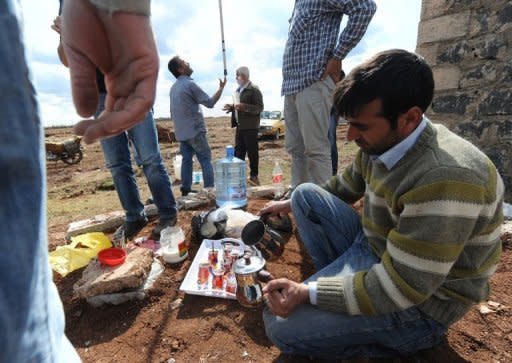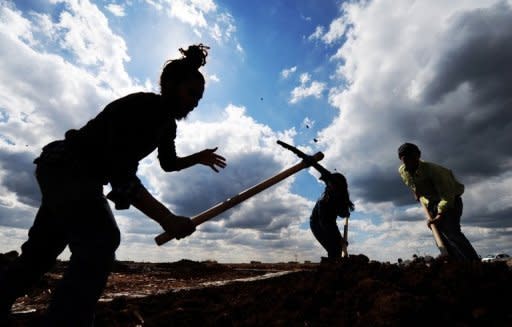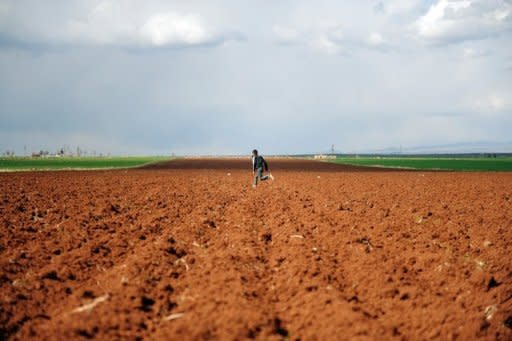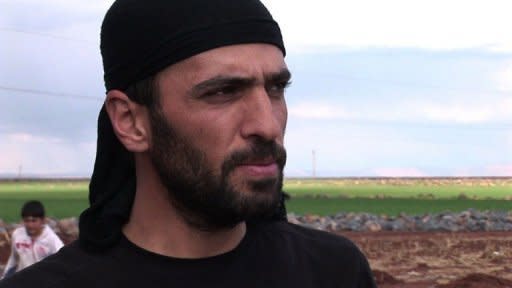Turkey's war-weary Kurds build villages for peace
A boy aged around 10 digs in the ground with a pickaxe that is almost his size as another struggles under a huge water container at a construction site in southeastern Turkey. Far from the classic concept of child labour, these youngsters are helping their own families to build homes from the mud and volcanic rock of this impoverished area in a defiant bid to take their future into their own hands. The 48 Kurdish families last month descended from their crowded rented apartments on the outskirts of the city of Viransehir, rolled up their sleeves and started work on a vast, green plain surrounded by far-away mountains. "This should be a message to the state, which believes that we are dependent on it. No, we can build our lives on our own and this is proof," said one of the builders, Huseyin Aksoy. Such villages are being promoted by Kurdish grouping the Democratic Society Congress, not just to build homes but also to promote peace and lay foundations for a "new life" in a region scarred by war and chronic poverty. For 26 years ethnic Kurds have been fighting for self-rule in the area of southeastern Turkey where they are the majority. The conflict, largely between the Turkish army and separatist Kurdistan Workers' Party (PKK), haunts people here with more than 45,000 already killed. "Every household in this region has at least one dead," said a 50-year-old man at the construction site who did not want to give his name. "We suffered a great deal and now we want to live in peace. These houses are our hope for this." This "peace village" will be named Ax u Av which means "soil and water" in Kurdish. It will be organised as a farming cooperative based on a system of "democratic autonomy" that even allows children above the age of six into decision-making processes. One of this project's three "child coordinators", 14-year-old Seyhmus Aydogan, said enthusiastically: "We decided on a park and basketball, volleyball and tennis courts, and they are all to be built." Plans were drawn up together. "They had separate meetings and made decisions concerning the village plan," said project mastermind Metin Yegin at the building site. Yegin has studied peace processes in Central American countries like El Salvador and Guatemala, and says such democratically run villages can prevent new outbreaks of violence even after peace has been secured. "In such countries peace has lasted for at least 13 years but now the number of people who die in daily clashes over economic interests is higher than those who died in the guerrilla war period," he said. In Turkey the model calls for Kurds to lay the ground for self-rule by organising in village communes or city assemblies and setting up their own economic systems. The Democratic Society Congress announced the model in January as a proposal for a solution to the Kurdish issue, but it only drew anger from the government and military which slammed it as an attack on the country's unity. The PKK is meanwhile considering breaking a unilateral truce it announced in August saying it had become "meaningless" because Ankara had failed to draw up a strategy for reconciliation. The government last year launched a cautious, low-profile bid for a dialogue with the Kurds, seeking to cajole PKK into permanently laying down arms. But the process has so far failed to produce any visible results. In a challenge to Ankara, Kurdish politicians last month started a series of protests to demand Kurdish-language education, the release of jailed political activists, election reforms, and an end to military operations against the PKK. In the meantime more projects similar to the "peace villages" are planned in other southeastern Turkish provinces in an effort to boost Kurdish self-confidence, said another activist, Hamza Buyuktas. "This is a message to our own community rather than to state: those people took initiative to decide about their own lives, they are going to solve everything on their own," he said.





